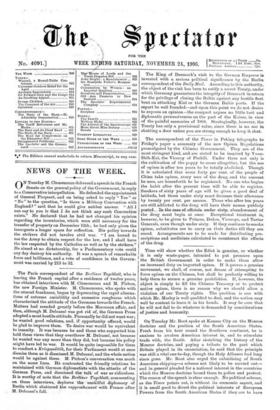The Paris correspondent of the Berliner Tageblatt, who is leaving
the French capital after a residence of twelve years, has obtained interviews with N. Clemenceau and N. Pichon, the new Foreign Minister. N. Clemenceau, who spoke with the utmost frankness, began by deprecating the rapid alterna- tions of extreme amiability and excessive roughness which cliaracterised the attitude of the Germans towards the French. Matters had mended greatly before the Moroccan affair, and then, although M. Delcasse was got rid of, the German Press adopted a most hostile attitude. Personally he did not want war; he wanted good relations, and, if opportunity offered, would be glad to improve them. To desire war would be equivalent to insanity. It was because he and those who supported him held these views that they overthrew N. Delcasse, not because he wanted war any more than they did, but because his policy might have led to war. It would be quite impossible for them to conduct a Kriegspolitik, for their Parliament would at once dismiss them as it dismissed M. Delcasse, and the whole nation would be against them. N. Piohon's conversation was much on the same lines. Ed contrasted the friendly relations he maintained with German diplomatists with the attacks of the German Press, and dismissed the talk of war as ridiculous. It is worthy of note that the Berliner Tayeblatt, commenting on these interviews, deplores the unskilful diplomacy of Berlin which shattered the rapprochement with France after H. Delcasse's fall.














































